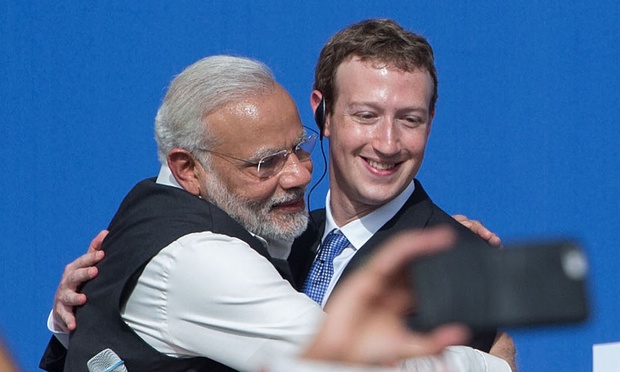IS THE MODI-ZUCKERBERG 'CONCERN' FOR THE POOR A FIRST STEP TO CONTROL THE INTERNET?
The big hug that could make internet freedom history

NEW DELHI: Mark Zuckerberg’s idea of internet.org, claiming to create free internet but actually leading to separately sellable and controllable segments within internet has found a partner in Indian Prime Minister Narendra Modi.
PM Modi who is projecting himself as a ‘development man’ pushing for technological growth, bringing foreign investment, creating jobs and even getting a permanent seat the the United Nations Security Council, showcased this through meetings with US industry heads, and Mark Zuckerberg, CEO of Facebook. The top honchos joined the media in an uncritical celebration of the Prime Minister’s entire visit that was not covered by the American media but remained on top of the headlines in India.
The Modi-berg seems to have hit net neutrality in India, during the special, long meeting with Zuckerberg at the Facebook Headquarters. Both spoke of providing free internet to the poor and this is at the centre of the new Modi-Zuckerberg cooperation.
The tip of the Modi-berg is Internet.org, an idea to provide internet for free to some, but in the process creating a more layered and controllable internet on the other side. The free package will include a maximum of 50 websites, decided upon by Facebook and of course the government of India. The paid internet that remains will get segmented on the basis of speed and restrictive niches based on interests and trends. Internet as a free platform through which a blogger or a group can reach out with its ideas and arguments to the people through the web will, thus, soon become history if this plan goes through.
If a website/blog is not part of some package that people can subscribe to, it can almost forget about being heard on internet. And such packages would be more attractive because of the specific interests they would cater to, and would also possibly be made more affordable by websites that will join the specific packages and earn advertisements. Big business will thus, be able to make an entry in determining the ‘complexion’ of such attractive packages. High cost advertisements will also contribute to the costs of internet, with many sites being led to an early ‘death’ in the process.
So what about the Indian poor? Internet packages on mobile have become costlier since PM Modi has assumed power. Restricting the poor to a limited number of free websites, rather than the internet cannot be a way to allow them internet access.
Indian poor appear to be nothing more than a chip in this bargain. If the poor are indeed the yardstick as both the Prime Minister and Zuckerberg insisted then this can only be justified by providing free internet to them. And not a ‘selected’ bouquet of free packages determined by those controlling power and money.
If you want to end net neutrality, justify it by claiming its providing free internet to the poor.
Zuckerberg has been trying hard to end net neutrality through internet.org which is waiting to be developed on the above lines. Ironically, he and PM Modi are both talking about empowerment through technology, while the aim is to restrict the technology to the favoured some.
For more details and a full perspective on net neutrality and facebook’s internet.org, see these two links:
First an article simplifying internet.org for you –
Facebook’s Internet.Org Promises Free Internet For All. But Here’s What They’re Not Telling You
And a video which explains the threat to net neutrality, although it was made in a slightly different context when India’s Department of Telecommunications was trying to push it through with partnership with some domestic corporations. This was virtually rejected but now Zuckerberg seems to have taken over where the Telecom authorities let off.



